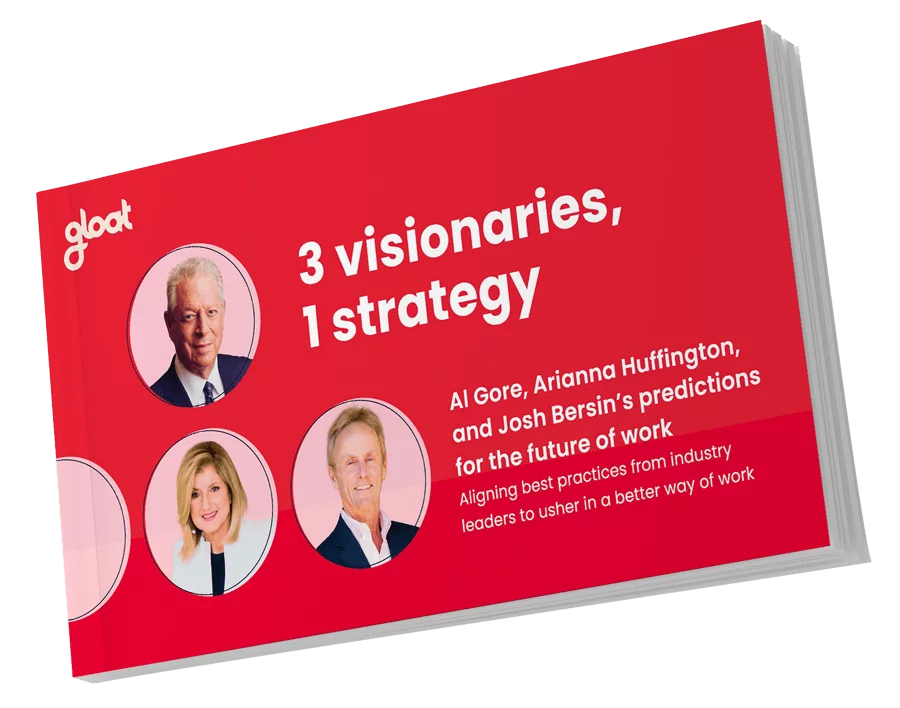Bersin and Enderes on talent marketplaces becoming the new core of people strategy
Taking skills initiatives from HR interests to business priorities
Kathi Enderes and Josh Bersin share how companies like Mastercard, HSBC, and Schneider Electric are enabling future-fit workforces
Talent marketplaces are answering new questions. Before the pandemic stress tested their efficacy, many HR leaders were asking “what” a talent marketplace was—or “why” their company even needed one.
A few years ago, talent marketplaces were hardly on the radars of talent leaders. Today, they’ve proven to become invaluable tools for organizations looking to prepare for the next generation of work.
Josh Bersin and Kathi Enderes joined Gloat’s Brian Hershey to share the talent marketplace question on the minds of HR leaders today: How can a talent marketplace help my organization prepare for an uncertain future?
“The talent marketplace is the noun, but the problem is talent mobility and growth,” Bersin explains. “If you think about the need for growth, agility, and mobility inside of your company, that’s what this is. It’s a system that solves those problems. It does it in a new way with a marketplace model, using AI, by leveraging a lot of data. And it’s relatively easy and compelling for employees to use.”
But beyond engaging employees and opening up career paths, the talent marketplace can revitalize a company’s innovation quotient. Connecting talent from across your organization has cascading benefits, Kathi Enderes shares, and limiting the scope of a talent marketplace to just one focus or another ignores the platform’s greatest strengths: scale, scope, and flexibility.
Enderes explains that “…the benefits of the talent marketplace go well beyond employee benefits. Of course, it’s going to help retain people and engage people and positively affect people, but you are also going to have better products, better services, and more innovative services because you have all this cross-functional collaboration. It’s not just cost savings and employee stuff, which is of course, important, but a way to make better products.”
From Schneider Electric unlocking more than 360,000 hours to HSBC breaking down geographic silos to better innovate in its sector, talent marketplaces are moving beyond theory and into practice—the only question left is, where will a talent marketplace take organizations next?

3 visionaries, 1 strategy
When global tensions disrupt supply chains, inflation takes a toll on investment markets, and workers’ demands increase, leaders must activate new strategies to keep pace.
Where companies traditionally addressed economic downturns through layoffs and hiring pauses—and may still need to resort to them to maintain solvency—new tools can mitigate the damage these processes can have on an enterprise’s objectives and, at times, even forgo the need for headcount cuts.
Al Gore, Arianna Huffington, and Josh Bersin share their predictions on the future of work and how industry leaders can usher in the new era of workforce agility
‣ Top takeaways
“A talent marketplace is one of the most impactful things you can do in improving learning and development,” Kathi Enderes says. “We studied organization and work design, and guess what? The most high-performing, most agile organizations use talent marketplaces. The CEO of Telstra, an Australian telecommunications company, went completely agile. When I asked her how she did this she said, ‘it's impossible without a talent marketplace, it's impossible. You couldn't do it right, because you don't know how you staff these agile projects.’
“When we studied talent acquisition, the same thing came up as well. So when we started talent acquisition, internal mobility, and using talent marketplaces to hire from within and redeploy people into different positions, it also came up as one of these most impactful practices. I think the reason why this is so transformational is it doesn't fit into one of the buckets of HR, right? Who owns it? Is it, is it learning? Is it talent acquisition? Is it organization effectiveness and design? It crosses all of them and really turns them on their heads.”
“It isn't only because people want [change], it's because this is the new model of business,” Josh Bersin says. “Most of the company or HR practices of the past were designed around this idea of industrial scale: more people in the same job, doing the same work for cheaper and cheaper to scale. Somewhere in the 1980s or 1990s, that model broke. GE and all of those scale-oriented companies fell apart, and they were disrupted by innovation companies.
“So now, even if you're an insurance company like MetLife, if you're not constantly developing something new and innovating and coming up with new ideas and products and services, scale isn't gonna work,” Bersin continues. “So we can't even tolerate those careers anymore. The company just can't operate like that. There are economic reasons as to why this is happening, not just personal growth desire.”
“Skills is obviously not a new concept. I think what's new is that you can infer skills, that you can collect skills, and that you can use the skills in the talent marketplace, for example, to match people to opportunities and to gigs or projects,” Kathi Enderes says.
“The reason why the marketplace is so fantastic for [mentorships] is it's impossible to do this at scale without technology. I come back to the Schneider Electric case study when we interviewed them, and they said it would have taken them two weeks to make a connection between a person and mentor, or a person and a project. But now, it takes us two minutes and the person can review them just as quickly.”
“Don't feel the need to get perfect with your skills before,” Kathi Enderes says. “I think a lot of companies think, oh, I have to have all my skills taxonomies, and everything built out before I can even get started. But the talent marketplace will do it for you. It's going to give you these insights in the meantime.
“Also, it's going to add a ton of value to your people and to your managers. Diversity and inclusion is another benefit that we haven't even touched on. It's going to uncover opportunities for people that are usually hidden away. A talent marketplace is going to have a lot of additional benefits that you might not even think about beyond retaining people and mobility. So I think it's just getting started on it and not, not being afraid of not being perfect.”
“Where most companies are is, you’ve already got this learning stuff, you've got this recruiting stuff, and you have this mobility stuff, and then you have the ERP. I have yet to talk to a company that has been able to use Workday Skills Cloud or another ERP system to do all this,” Josh Bersin says.
“So the way that where the market sits today, and I'm sure the Workday people will be upset that I say this, is the Workday, Oracle, or SAP skills technology is in some sense a repository or consolidation point for some of the other skills data, but it doesn't have the application intelligence and all the use cases built into it that the recruiting tools, the talent mobility tools or the learning tools do.”




